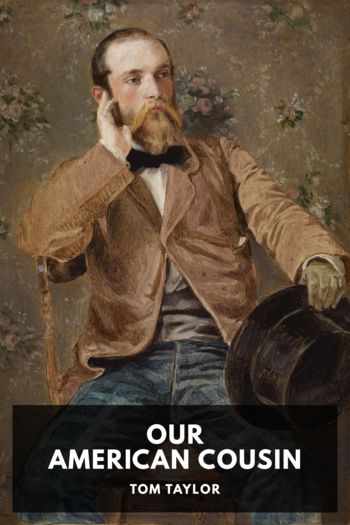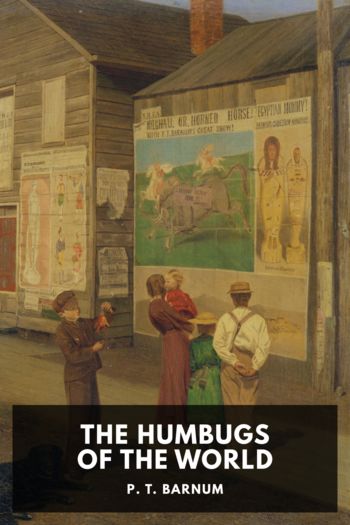Struggles and Triumphs by P. T. Barnum (love novels in english TXT) 📕

- Author: P. T. Barnum
Book online «Struggles and Triumphs by P. T. Barnum (love novels in english TXT) 📕». Author P. T. Barnum
On one occasion I happened to meet them at dinner with an English family in London, to whom I had, in the way of business, introduced them a few weeks previously. We had scarcely taken our seats at the table before Simpson happened to discover a dish of sweetmeats at the further corner of the table. Turning to the servant he said:
“Please pass me that sass.”
Mrs. Simpson’s eyes flashed indignantly, and she angrily exclaimed, almost in a scream:
“Say sauce; don’t say ‘sass.’ I’d rather hear you say h⸺l a d⸺d sight!”
That our English hostess was amazed and shocked it is needless to say, although she preserved her equanimity better than could be expected. As for myself, I confess I could not refrain from laughing, which, of course, served only to increase the wrath of Mrs. Simpson.
Fourteen years subsequent to this event, I called on this English lady in company with an American friend. In the course of conversation, I happened to ask her if she remembered about Mrs. Simpson’s “sass.” She took from a drawer her memorandum book, and showed us the above expression verbatim, which, she said, she wrote down the same day it was uttered; and she added she had never been able to think of it since without laughing.
I met Simpson and his wife at a hotel in Marseilles, France, in the summer of 1845. Mrs. Simpson said she and Simpson had almost determined not to go to France at all when they “heard it was necessary to hire an interpreter to tell what folks said.” Said she, “I told Simpson I didn’t want to go among a set of folks who were such cussed fools they couldn’t speak English! But of course we must go to France just for the speech of the people when we get home, so here we are. For my part,” she continued, “I speak English to these Frenchmen anyhow, and if they can’t understand me they can go without understanding. The other morning, I told the waiter my tea was too sweet. I found afterwards that too sweet (toute de suite) was French for ‘very quick.’ ”
“ ‘Oui, madame,’ he replied, ‘oui, oui, que voulez vous?’ (what will you have?)”
“ ‘Too sweet, too sweet,’ I repeated, ‘too sweet, too sweet.’ Then I pointed to my tea, and said again, ‘Too sweet, d⸺n your stupid head, can’t you understand too sweet?’ The fool jumped around like a hen with her head cut off, and kept saying, ‘Oui, oui, madame, too sweet, qu’est ceque c’est? (What is it?)’ Finally an English gentleman asked me what was the matter, and when I told him, he explained by telling me that too sweet (toute de suite) in French meant quick, very quick, and that was what made the stupid waiter jump around so.”
“But d⸺n the French waiters,” she continued, “I have got quit of them finally, for I have found out a language we both understand.
“The same day my tea was too sweet, Simpson was out at dinner time; and I went to the table alone. I called for soup, and the sapheads brought me some sort of preserves. I then called for fish, and the fools could not understand me. Then I said, ‘Bring me some chicken,’ and d⸺n ’em, they danced about in a quandary till I thought I should starve to death. But finally I thought of roast duck. I am dreadfully fond of duck, and I knew they always had stuffed ducks at dinner time. So I called to the waiter once more, and pointed to my plate and said, ‘quack, quack, quack, now do you understand?’ and the fool began to laugh, and said, ‘Oui, madame, oui, oui,’ and off he ran, and soon brought me the nicest piece of duck you ever saw. So now every day at dinner, I say ‘quack, quack,’ and I always get some first-rate duck.”
I congratulated her on having discovered a universal language.
The same day, I met a young Englishman in the hotel, who had been travelling in Spain. During our conversation we were summoned to dinner. At the table d’hôte, Simpson happened to be seated exactly opposite us. As we continued our conversation, Simpson heard it, and his attention was particularly arrested—it being something of a novelty to meet a stranger in these parts, who spoke our native tongue. The English gentleman mentioned that he ascended the Pyrenees the week previous.
“I should like to have been with you,” I remarked, “but I am almost too fat and lazy to climb high mountains. I suppose you found it pretty hard work.”
“Yes, we had to rough it some; we encountered considerable snow,” he replied.
“Snow!” exclaimed Simpson, in astonishment.
The Englishman looked with surprise at this interruption; for he did not know Simpson, nor had he ever heard him speak before. However, he quietly replied, “Yes, sir, snow.”
“Not by a d⸺d sight, you didn’t,” replied Simpson, emphatically. “That wont go down. Snow in August wont do. I have seen snow myself in Connecticut, the last of September, but it wont do in August, by a thundering sight.”
The Englishman sprang to his feet, but I hit him a nudge, and said, “It is all right. Excuse me; let me introduce my friend, Mr. Simpson, from America. He has travelled some, and it is pretty hard to take him in with big stories.”
He comprehended the matter instantly and sat down.
“Yes, sir,” remarked Simpson, “I have heard travellers before, but August is a leetle too early for snow.”
“But suppose I should say it was not this year’s snow?” said the Englishman, who was ready now to carry on the joke.
“Worse and worse,” exclaimed Simpson, with a triumphant laugh; “if it would not melt in August, when in thunder would it melt! You might as well say it would lay all the year round.”
“I give it up,” said the Englishman, “you are too sharp for me.”
Simpson was delighted, and





Comments (0)